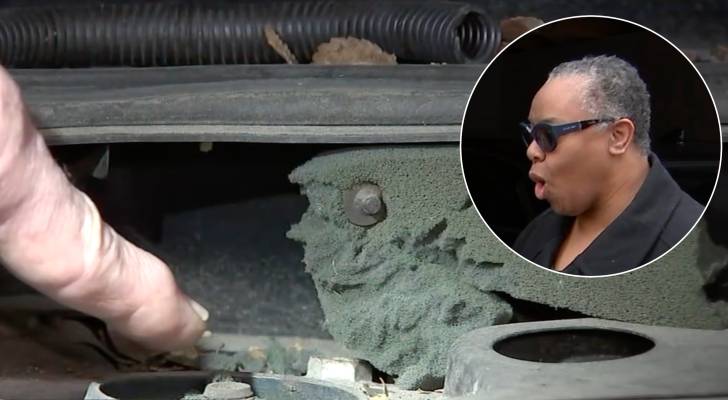
The last thing Chicagoans expect when they lift the hood of their car is a literal rat’s nest.
But rodents do enjoy curling up in warm spaces and chewing on any available wires, which makes nestling in the engine block of your vehicle a cozy spot. And, much to the chagrin of residents, rats have been making themselves at home in vehicles all over the Windy City.
Don’t miss
- I’m 49 years old and have nothing saved for retirement — what should I do? Don’t panic. Here are 5 of the easiest ways you can catch up (and fast)
- Gain potential quarterly income through this $1B private real estate fund — even if you’re not a millionaire. Here’s how to get started with as little as $10
- Robert Kiyosaki warns of a ‘Greater Depression’ coming to the US — with millions of Americans going poor. But he says these 2 ‘easy-money’ assets will bring in ‘great wealth’. How to get in now
Once in your vehicle, rats can do a lot of damage. In one case, they caused more than $1,200 in damage to Koren Baker’s vehicle in the Irving Park East neighborhood.
“Whoa, that’s too much money to pay for just a rat,” Baker said in an interview with ABC 7 Eyewitness News Chicago.
Rat infestations are common in Chicago
Reports of rat infestations are racing up the list of complaints for the Department of Streets and Sanitation to deal with. Between April 2024 and April 2025, there were 43,400 complaints about rodents or rats to Chicago’s 311 hotline. That’s a 6.6% decrease in the average number of complaints from 2022 to 2024.
Rats often climb under plastic covers within car engines, destroy any available foam, build a nest, and chew through any easily accessible wires.
It’s a problem that master technician Mark Ferjak, of Berman Infiniti Chicago, has seen often. In addition to chewed wires, rodents leave their feces behind. Naturally, finding a rat under the hood — dead or alive — comes as a shock to car owners.
"I was very surprised, because I didn’t know it could be that big in the engine,” Koren Baker told ABC 7. “And we had been driving around with it for that many days.”
Further investigation showed that the rats chewed Baker’s insulation and made a little home out of it.
“You can see how they’ll take the insulation, chew it up, make a little nest, and then actually, here you can see the excrement,” Ferjak pointed out. “That is a lot, there, and it looks like they were there for a long time.”
While rats can find their way into your car, regardless of where you are in the city, the neighborhoods with people ratting out the pests include West Town, Lake View and Portage Park.
Read more: Want an extra $1,300,000 when you retire? Dave Ramsey says this 7-step plan ‘works every single time’ to kill debt, get rich in America — and that ‘anyone’ can do it
Protecting your vehicle from expensive rat infestations
Pest control experts have seen a sharp rise in the rat numbers in recent years.
"The population explosion of rats (that) has outweighed our efforts — collectively — to control them, is the bottom line of it,” certified pest management professional Janelle Iaccino with Rose Pest Solution said. “Coming out of the pandemic, the rats became widespread, not just residential areas, but commercial areas, too, and we can’t keep up with it. Their breeding is out of control.”
There are some cost-effective ways to prevent rats from nesting in your car. This means thinking beyond just your car. Ensure garbage cans in or around your garage or parking area are sealed, and if possible, avoid parking near any garbage bins, which attract rodents.
You can double-check the seal on your garage as rodents can flatten their bodies and squeeze through holes the size of a quarter. Also, store dog food, bird seed or grass seed in tightly sealed containers to avoid attracting vermin.
If you do smell a rat, Chicago residents can call 311. The city services team can help to set traps or bait the area.
Those willing to take protection measures another step further, consider signing up for a rodent control package. These services cost between $40 to $100 per month, which can be an offer that gives peace of mind. If ongoing expenses are not in your budget, consider wrapping a rodent-repellent tape around car wires. The tape is infused with capsaicin or peppermint and costs around $50 per roll.
For residents of rat-infested areas, adding pest control costs to their monthly budget might be a necessary expense.
What to read next
- JPMorgan sees gold soaring to $6,000/ounce — use this 1 simple IRA trick to lock in those potential shiny gains (before it’s too late)
- This is how American car dealers use the ‘4-square method’ to make big profits off you — and how you can ensure you pay a fair price for all your vehicle costs
- Here are 5 ‘must have’ items that Americans (almost) always overpay for — and very quickly regret. How many are hurting you?
Like what you read? Join 200,000+ readers and get the best of Moneywise straight to your inbox every week. Subscribe for free.
This article provides information only and should not be construed as advice. It is provided without warranty of any kind.